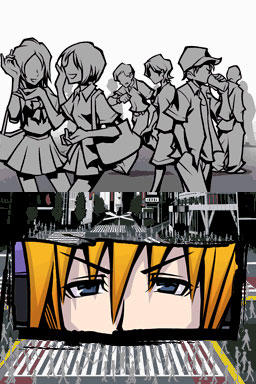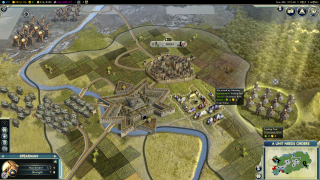(Don't) Tell Me A Story
By majormitch 21 Comments
Have you ever played a game that you felt shed light on how or why you live your life?
People like stories. We inherently like stories of all shapes and sizes, in as many areas of life as we can get them. Naturally, this extends to the realm of video games, where stories have only become more and more of a focus for the medium as it’s grown in popularity over the years. A friend recently asked me the above question when we were talking about video game stories, which initially sounded weird to me. While it’s not uncommon for other mediums, such as books or movies, to tell stories that can strongly affect people in that way, I generally don’t think about video games in the same light. At the same time, I have deeply enjoyed numerous video game “narratives” over the years, which got me thinking about what it is I personally get out of my favorite video game narratives.

First and foremost, there have been plenty of video game stories that I like for having endearing characters, an interesting plot with memorable moments, or themes that stick with me for some time after playing them. These games include things like Final Fantasy VI, Chrono Cross, God of War, Phoenix Wright: Ace Attorney, BioShock, The World Ends With You, Uncharted 2: Among Thieves, To the Moon, and so on. These types of games, for the most part, I consider to offer “traditional” storytelling, where a concrete story is told in a way that’s largely removed from the input of the player (aka, gameplay). This is probably still the most common form of storytelling in video games, and it also lies on the non-interactive end of the spectrum, thus making such stories the most analogous to other, non-interactive mediums. While I have highly enjoyed many such stories (particularly those in the games listed above), I don’t know that I would say any of them have made me reflect on my life to any substantial degree (then again, I’m not sure many stories in other mediums have either, but that’s another topic). Furthermore, I don’t think they’re the kinds of video game stories that have had the biggest impact on me while I’m actually playing games, as these stories exist separately from gameplay.
When I’m playing a game, its story is rarely at the forefront of my mind. I’m much more focused on grappling with what I, as an acting agent in a (hopefully) well realized world, need to be doing to complete whatever tasks lie before me. As such, the only narrative that immediately registers to me is that which pertains to what I can actively engage with. This is where some video game stories can often lose me; games can spend too much time explaining their overly convoluted context for what’s going on in a way that doesn’t involve the player (Metal Gear Solid is a prime example). Such lengthy exposition is often too far removed from what I can reasonably care about as the player, and can make me feel like I’m not a meaningful participant in the world, regardless of the quality of said exposition. On top of that, it’s simply too much to be introduced to dozens of characters and plot threads while also trying to grapple with any number of potentially complex (and hopefully interesting) gameplay systems.

In most cases, only once I’m in well versed in and engaged by those gameplay systems will I appreciate the greater context that they exist in (and even then games can still go off the rails later on). This context can certainly include traditional story and characters, but it also includes art, sound, world design and everything in between; the tiniest details can greatly affect the nature of the experience, and I would argue that all of these features should be considered when talking about a video game’s “narrative.” Video games are in the unique position where the author doesn’t have complete control over how the user digests their work. They can certainly guide and direct the process, but the player ultimately sets their own pace (outside of forced dialogue and cut-scenes, which is why those things can cause trouble if not used well), and thus discover and be affected by any number of potentially captivating details that exist within the game. This also means that each player can view the experience from a slightly different angle that’s uniquely meaningful to them, dependent to some degree on how they go about playing.
This relates to what I’ve frequently heard called “player driven narrative,” which is the best way I’ve found to describe my favorite video game narratives. Part of me hesitates to even call them “narratives,” because the word carries a certain amount of expectation, and what we’re talking about is a bit more abstract. Put as succinctly as I can, it’s the idea that the narrative of a game is that which describes the player’s own actions and experiences. When retelling the story of a game, you would tell it as the story of your character(s) and what they saw, what they heard, and ultimately what they did. The more detailed the story is the more interesting it becomes, and the more it’s told through your own choices and actions, rather than through forced exposition, the more player driven it becomes. As such, player driven narratives lie on the exact opposite end of the video game storytelling spectrum from the traditional storytelling I described above, as they are intrinsically tied to the interactivity of the medium. I have a hard time describing it any more directly than that, so let me try using a few examples to hopefully further illustrate what I mean.

When people think of great video game narratives, I don’t think Sid Meier’s Civilization series is usually at the forefront of the conversation, but I think these games create wonderful player driven narratives. If I were to tell one of my (many) Civilization stories, it might be about how I played as a peaceful Gandhi who was committed to scientific research and cultural prowess, and dealt with other leaders diplomatically rather than by force. It would be about how Tokugawa invaded in the Middle Ages, prompting me to muster up a small but advanced army to desperately protect my territory. It would be about how my citizens went on strike when they weren’t happy, and while I got frustrated at their lack of desire to work, I constructed cultural works and secured luxury resources to appease them. It would be about catching English spies who were trying to sabotage my construction of a space shuttle, and in the end it would be about launching said shuttle to Alpha Centauri. Those are very broad strokes of the story, but you can imagine the other nuances that fill in the gaps along the way to color the experience and make it more fulfilling, and how every player would have their own unique story to tell.

I would argue that every video game allows for player driven narratives to some degree, only that some games simply embrace the idea substantially more and/or do it better than others. Civilization is a favorite example of mine, but there are plenty of others that have captivated me over the years. Unsurprisingly, Firaxis’ other recent strategy game, XCOM: Enemy Unknown, succeeds with its narrative in much the same way as Civilization; everyone has a story about how their own squad came together, and how they did (or did not) stop the alien threat. Some other games that stand out to me as allowing for strong player driven narratives include Metroid Prime (or equally, Super Metroid), Shadow of the Colossus, Demon’s/Dark Souls and Journey. None of these games have much in the way of a traditional “story,” but I find myself thinking about my experiences with them substantially more than most games. While on the surface they appear to ignore what we often think of as story to focus on gameplay, I would argue that their narratives (including all that entails) are so intrinsically tied to their gameplay that it’s all basically the same thing. Take Metroid Prime for example. Nowhere is it explained or directed that Samus explores Tallon IV’s ancient Chozo Ruins, uses a spider ball suit enhancement to traverse the fiery Magmoor Caverns, or searches the Space Pirates’ data archives for information on their experiments. And yet players of Metroid Prime know these things happen because we do these things. The game doesn’t explicitly tell us to do these things either, but by participating in the game’s beautifully designed world we’re able to process what we see and hear into useful information that guides our own narrative. The gameplay is the story, which creates a very seamless package that’s much easier for me to become immersed in, compared to those where gameplay and story are disjoint.
I think it’s that immersion that ultimately wins me over on player driven narratives when compared to other ways of telling stories in video games, and why it dramatically helps a game’s cause to successfully merge gameplay, story, characters, art, sound, world design, and so on into one unified whole. If a video game can create a rich, immersive setting for me to participate in and discover on my own volition, with minimal direct exposition, then I’m much more likely to feel invested and connected to what’s happening on screen. That opens the doors for an infinitely more powerful and lasting (and oddly personal) experience for me than traditional storytelling can hope to muster, which goes to great lengths to explain why I find video games such a unique and fascinating medium in the first place. I still don’t know that any video game story has ever caused me to reflect on my life in the way my friend was asking, which may simply be more a reflection of me as a person (and/or my drama-free life) than a trait of video game storytelling in general. What I do know, however, is that the most meaningful video game narratives for me on a personal level are often player driven ones.
